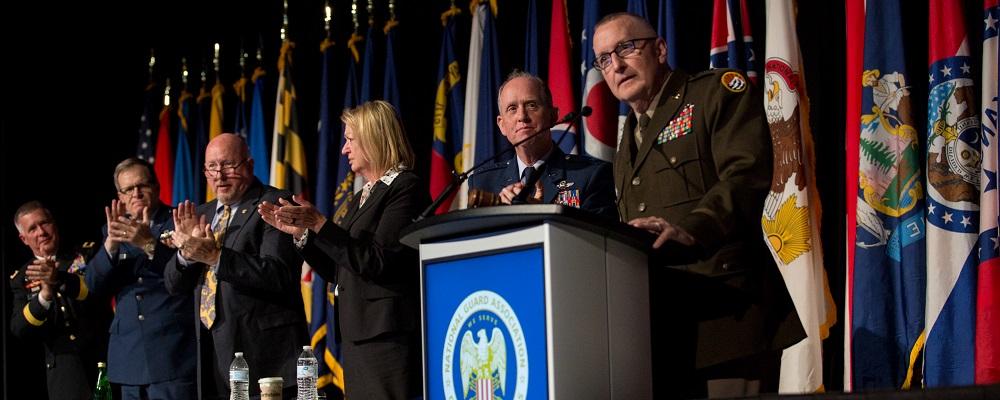
NGAUS and the adjutants general of the 54 states, territories and the District of Columbia are standing against proposed legislation that attempts to negatively change the National Guard.
The debate over three provisions of the Senate version of the fiscal 2020 National Defense Authorization Act came to a head at the 141st General Conference & Exhibition in Denver.
Maj. Gen. Matt Quinn, the president of the Adjutants General Association of the United States, strongly opposed the provisions during his remarks on Monday, near the end of the four-day event. The theme of the annual conference was The National Guard: An American Treasure.
He said opposing the legislation is one of the top priorities of AGAUS.
“We as a body have got to get in front of these destructive legislative items that would result in a weakened National Guard, a weakened national treasure,” said Quinn, the Montana adjutant general.
The three provisions, sections 1036, 1037 and 1038, would grant new powers to the National Guard Bureau.
NGAUS is also opposed to the provisions, said retired Brig. Gen. J. Roy Robinson, the NGAUS president, who added that the language was written without input of the adjutants general or the nation’s governors.
Section 1036 would grant the NGB chief inspection authority over Guard finances that come from the federal government.
“Currently, our Army and Air Force have inspection authority over our states. As adjutants general, we welcome that oversight and work to ensure the federal requirements are met within our states,” Quinn said. “We are manned and we are equipped by the U.S. Army and the U.S. Air Force. We go to war with the U.S. Army and U.S. Air Force. So who should have inspection authority over the states? The U.S. Army and U.S. Air Force. Not a bureau, created and authorized as a channel of communication between the states and the Pentagon and Capitol Hill.
“They are not a command organization. They are a bureau with well-intended Guard men and women from our states, but who should not aim to be a command element of our National Guard,” he added.
Section 1037 would expand the authority of the president, in cases in which a state National Guards fails to comply with federal law and policy, to limit or completely bar federal funds from by the state and withdraw federal recognition of Guard officers and/or units.
The president, who can delegate that authority to the defense secretary, would only be required to inform leaders of the House and Senate Armed Services committees and would not need to ask permission to bar funds or withdraw recognition.
Section 1038 would fully remove the authority of governors to nominate the property and fiscal officer for their state and would require those officers not have worked within a state they are assigned for the previous three years.
Quinn said the provision essentially builds a brick wall around the entire property and fiscal officer organization in a state, placing it under NGB. He described the proposal as “insane.”
“Do you all think that language came from Capitol Hill? No. It came from the National Guard Bureau, our channel of communication to Capitol Hill,” Quinn said. “And I’m forced to ask, does that language benefit the soldiers and airmen of our states, territories and the District of Columbia? Or does it simply serve to move NGB into a position of greater control over our states.
“Look around this room,” he added to the officers gathered in Denver’s Colorado Convention Center. “Are we organized by NGB regions? No. We are organized by states, territories and the District of Columbia and that’s the way we should remain.”
Gen. Joseph Lengyel, the NBG chief, had an opportunity to address leaders’ concerns over the provisions earlier in the conference.
Speaking to attendees on Saturday, Lengyel was asked about the provisions during a Q&A session following his remarks.
He said the provisions sounded reasonable, but that the decision ultimately lies with Congress.
“If Congress wants me to have that oversight authority and responsibility then they have to give me those authorities,” he said.
Said Quinn, “We cannot let a few who don’t respect what we represent change us to what they believe we should be."
“What happens to a treasure when it is squandered or neglected or buried? Forgotten, it is lost. That’s exactly why you all have this organization, our NGAUS, and our Adjutants Guard Association, fighting each and every day to ensure our national treasure is not squandered by poor legislation or poor decisions at the national level that risk our National Guards of the 54,” he said.
